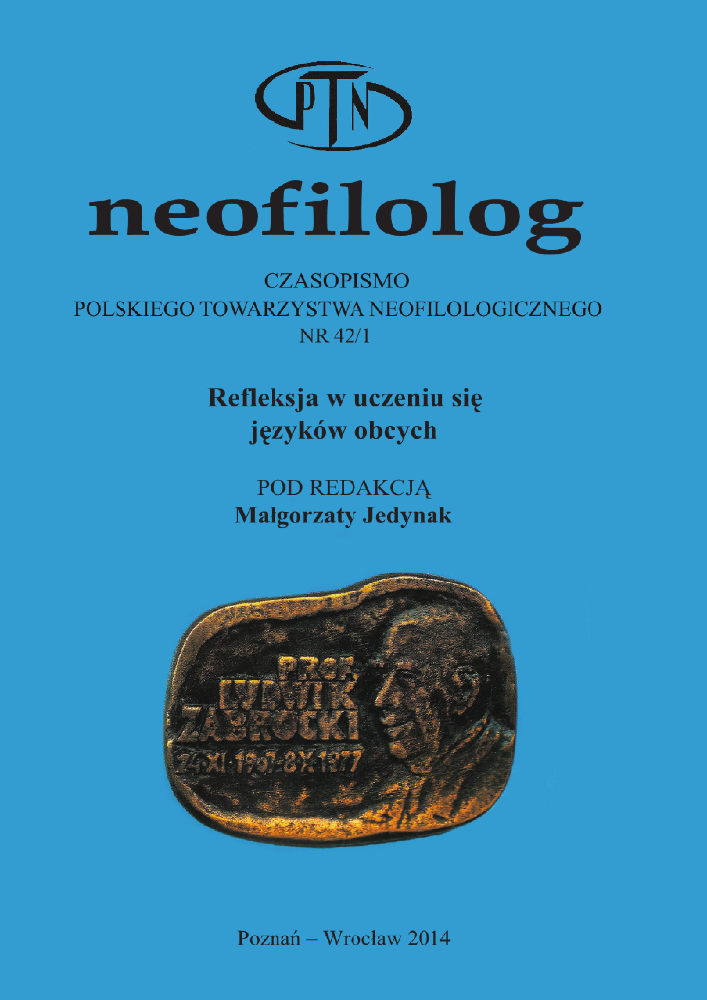Résumé
This paper reports on some of the data from a large-scale study Teaching and Learning Foreign Language in lower secondary school, which began in the school year 2011-12 and traces selected groups of learners through the three years of Key Stage 3 (gimnazjum), ending in school year 2013-14. The study was conceived and is managed by the Foreign Language Section of the Educational Research Institute (ERI) in Warsaw with European funding. (see Acknowledgement). In this article the focus is on data obtained from interviews conducted with learners from class one of 120 lower secondary schools, where the students were asked to describe and give opinions about learning English in their school and to imagine an ideal lesson. The learners are the reason that lessons in school take place, but their views are rarely consulted. This study attempts to redress the balance.Références
Bragg, S., 2007. Consulting young people: a review of the literature London: Creative Partnerships.
Cook-Sather, A, 2002. "Authorising students’ perspectives: toward trust, dialogue, and change in education". Educational Researcher. 31/4: 3-14.
Czerniawski, G and Kidd, W. 2011. The Student Voice Handbook: Bridging the aca-demic/practitioner divide. Bingley: Emerald Group Publishing.
Czyż, E. (n.d.) Prawa ucznia w szkole. Warszawa: Helsińska Fundacja Praw Człowieka. Retrieved from htp://www.bezuprzedzen.org/doc/Prawa_ucznia_w_szkole_HFPCz.pdf on 30.09.2013.
Flutter,J. and Ruddock, J. 2004. Consulting pupils: What’s in it for schools? London: Routledge Falmer.
Kozol, J. 1991. Savage inequalities: Children in America’s schools. New York: Harper Perennial.
Ministerstwo Edukacji Narodowej. 1992. Zarządzenie nr. 14 z dnia 19.06.1992 w sprawie ramowych statutów szkół publicznych.
Ministerstwo Edukacji Narodowej. 2009. Postawa Programowa z komentarzami. Języki Obce.
Oldfather, P. 1995. “Songs “come back most to them”: Students’ experiences as Researchers”. Theory into Practice, 43 (2):131-137.
Rudd, T., Colligan, F., and Naik, R., 2007. Learner Voice: A Handbook. Bristol: Future-lab. Ruddock, J. 2004. Pupil voice is here to stay! Retrieved from http://www.serviceschoolsmobilitytoolkit.com/resourcedownloads/staffroom/bpv_theneedtoinvolvepupilvoice.pdf on 30.09.2013
Ruddock, J. and Flutter, J. 2004. How to improve your school: giving pupils a voice, London: Continuum.
Strucker, M., Moise, L. N., Magee, and V. L., Kreider, H. 2001. “Writing the wrong: Making schools better for girls” (w:) In our own words: Students’ perspectives on school. J. Shultz i A. Cook-Sather (red.) Lanham, MD: Rowman & Littlefield: 149-164.
Licence
© Neofilolog 2019

Ce travail est disponible sous licence Creative Commons Attribution - Pas de Modification 4.0 International.
Auteurs :
Les auteurs de textes acceptés pour publication dans la revue Neofilolog sont tenus de remplir, signer et renvoyer à l'adresse de la rédaction, un accord sur l'octroi d'une licence gratuite pour les œuvres, avec obligation d'accorder une sous-licence CC.
En vertu de cet accord, les auteurs des textes publiés dans la revue Neofilolog accordent à l'Université Adam Mickiewicz de Poznań une licence non exclusive et gratuite et permettent l'utilisation de la sous-licence Creative Commons Attribution-NoDerivatives 4.0 International (CC BY-ND 4.0).
Les auteurs se réservent le droit de disposer librement de l'œuvre.
Utilisateurs :
Les utilisateurs d'Internet intéressés ont le droit d'utiliser les œuvres publiées à partir de l'année 2017 sous réserve des conditions suivantes :
- reconnaissance de la qualité d'auteur - l'obligation de fournir des informations sur la qualité d'auteur, le titre, la source (liens vers l'œuvre originale, DOI) et la licence, ainsi que l'œuvre distribuée ;
- sans créer d'œuvres dérivées - l'œuvre doit être conservée dans sa forme originale, p. ex. les traductions ou les interprétations ne peuvent être distribuées sans le consentement de l'auteur.
Tous les textes publiés sont soumis au droit d'auteur.
Autres :
L'Université Adam Mickiewicz de Poznań se réserve le droit à la revue dans son ensemble (mise en page, forme graphique, titre, conception de la couverture, logo, etc.).
.
